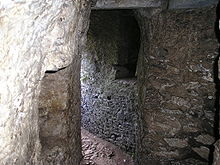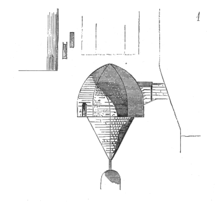- Dungeon
-
"Oubliette" redirects here. For other uses, see Oubliette (disambiguation).This article is about places of imprisonment in European castles. For other uses, see Dungeon (disambiguation).
 The dungeons of Blarney Castle, Ireland.
The dungeons of Blarney Castle, Ireland.
A dungeon is a room or cell in which prisoners are held, especially underground. Dungeons are generally associated with medieval castles, though their association with torture probably belongs more to the Renaissance period. An oubliette is a form of dungeon which was accessible only from a hatch in a high ceiling.
Contents
Etymology
The word dungeon comes from Old French donjon (also spelt dongon), which in its earliest usage, meant "a keep, the main tower of a castle which formed the final defensive position to which the garrison could retreat when outer fortifications were overcome". The first recorded instance of the word in English near the beginning of the 14th century also meant "an underground prison cell beneath the castle keep". While some sources cite Medieval Latin dom(i)niōn- "property" (and ultimately dominus "lord") as the original source, it is more likely that the word derives from the Frankish *dungjo, *dungjon- ("dungeon, vault, bower"), from Proto-Germanic *dungjōn, *dungō ("a cover, enclosed space, treasury, vault"), from Proto-Indo-European *dhengh- ("to cover, hide, conceal"),[1] related to Old High German tung ("a cellar, underground living quarter"), Old English dung ("a dungeon, prison"), and Old Norse dyngja ("a lady's bower"). In English, a dungeon now usually only signifies the sense of underground prison or oubliette, typically in a basement of a castle, whereas the alternate spelling donjon is generally reserved for the original meaning.
In French the term donjon still refers to a "keep", and the term oubliette is a more appropriate translation of English "dungeon". Donjon is therefore a false friend to "dungeon" (for instance, the game "Dungeons and Dragons" is titled "Donjons et Dragons" in its French editions).
An oubliette (from the French oubliette, literally "forgotten place") was a form of dungeon which was accessible only from a hatch in a high ceiling. The word comes from the same root as the French oublier, "to forget", as it was used for those prisoners the captors wished to forget.
The earliest use of oubliette in French dates back to 1374, but its earliest adoption in English is Walter Scott's Ivanhoe in 1819: 'The place was utterly dark—the oubliette, as I suppose, of their accursed convent.'[2] There is no reason to suspect that this particular place of incarceration was more than a flight of romantic elaboration on existing unpleasant places of confinement described during the Gothic Revival period.
History
Few Norman keeps in English castles originally contained prisons, though they were more common in Scotland. Imprisonment was not a usual punishment in the Middle Ages, so most prisoners were kept pending trial or awaiting the penalty, or for political reasons. Noble prisoners would not generally be held in dungeons, but would live in some comfort in castle apartments. The Tower of London is famous as prison for political detainees, and Pontefract Castle at various times held Thomas of Lancaster (1322), Richard II (1400), Earl Rivers (1483), Scrope, Archbishop of York (1405), James I of Scotland (1405–1424) and Charles, Duke of Orléans (1417–1430). Purpose-built prison chambers in castles became more common after the 12th century, when they were built into gatehouses or mural towers. Some castles had larger provision for prisoners, such as the prison tower at Caernarvon Castle. Alnwick Castle and Cockermouth Castle, both in Northumberland, had prisons in the gatehouse with oubliettes beneath them.[3]
Features
 Diagram of alleged oubliette in the Paris prison of La Bastille from Dictionary of French Architecture from 11th to 16th Century (1854–1868), by Eugène Viollet-le-Duc; the commentary speculates that this may in fact have been built for storage of ice.
Diagram of alleged oubliette in the Paris prison of La Bastille from Dictionary of French Architecture from 11th to 16th Century (1854–1868), by Eugène Viollet-le-Duc; the commentary speculates that this may in fact have been built for storage of ice.
Although many real dungeons are simply a single plain room with a heavy door or with access only from a hatchway or trapdoor in the floor of the room above, the use of dungeons for torture, along with their association to common human fears of being trapped underground, have made dungeons a powerful metaphor in a variety of contexts. Dungeons, in the plural, have come to be associated with underground complexes of cells and torture chambers. As a result, the number of true dungeons in castles is often exaggerated to interest tourists. Many chambers described as dungeons or oubliettes were in fact storerooms, water-cisterns or even latrines.[4]
An example of what might be popularly termed an "oubliette" is the particularly claustrophobic cell in the dungeon of Warwick Castle's Caesar's Tower, in central England. The access hatch consists of an iron grille. Even turning around (or moving at all) would be nearly impossible in this tiny chamber.[citation needed]
In literature
Oubliettes and dungeons were a favourite topic of nineteenth century gothic novels or historical novels, where they appeared as symbols of hidden cruelty and tyrannical power, the very antithesis of Enlightenment values such as justice and freedom. Usually found under medieval castles or abbeys, they were used by villainous characters, often Catholic monks and inquisitors, to persecute blameless characters. In Alexandre Dumas's La Reine Margot, Catherine de Medici is portrayed gloating over a victim in the oubliettes of the Louvre.[5]
Modern criminals' dungeons
The term "dungeon" is still used to describe an underground prison, such as the hidden cells built by certain notorious criminals:
- Marc Dutroux, Belgium
- John Esposito,[6] United States
- Josef Fritzl,[7] Austria
- John Jamelske, United States
- Viktor Mokhov,[8] Russia
- Wolfgang Priklopil, Austria
- Li Hao (李浩), Peoples Republic of China [9][10][11]
References
- ^ "Webster's New World College Dictionary, "dungeon."
- ^ Oxford English Dictionary
- ^ Bottomley, Frank, The Castle Explorer's Guide, Kaye & Ward, London, 1979 ISBN 0718212169 pp 143–145
- ^ Bottomley, Frank, The Castle Explorer's Guide, Kaye & Ward, London, 1979 ISBN 0718212169 p 145
- ^ Alexandre Dumas, La Reine Margot, XIII Oreste et Pylade
- ^ McQuiston, John (1994-07-27). "Man Sentenced to Prison In Kidnapping of L.I. Girl". New York Times. http://query.nytimes.com/gst/fullpage.html?res=9C0DE2D6113EF934A15754C0A962958260. Retrieved 2008-08-22.
- ^ "Josef Fritzl: Incest dungeon father could face up to 3,000 counts of rape". The Telegraph (London). 2008-08-03. http://www.telegraph.co.uk/news/newstopics/joseffritzl/2619085/Josef-Fritzl-Incest-dungeon-father-could-face-up-to-3000-counts-of-rape.html. Retrieved 2008-08-22.[dead link]
- ^ "Russian girls rescued after 3 years in rape dungeon". Sydney Morning Herald. 2004-05-07. http://www.smh.com.au/articles/2004/05/06/1083635279844.html. Retrieved 2008-08-22.
- ^ Government employee kept 6 sex slaves in self-built dungeon, 2 killed
- ^ 洛阳恶男挖地窖囚禁6名卖淫女当性奴 不听话就杀死/图
- ^ 洛阳性奴案4女子获救即被刑拘 警方已向公安部报告
See also
Categories:- Castles
- Rooms
- Imprisonment and detention
Wikimedia Foundation. 2010.
